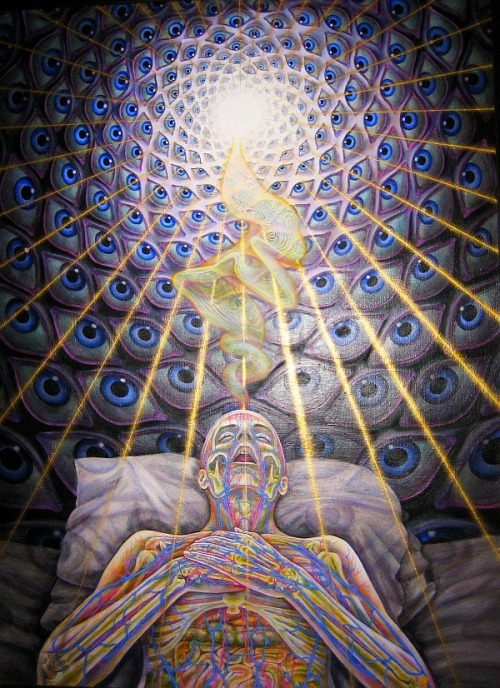 |
| View from my sister's balcony |
We are our experience, not the things in our experience. As I gaze upon the sunset, it occurs to me that as the sun dips low and bathes the clouds in a golden light from below, that I
am that golden light, I
am that cloudscape. It exists in my mind, making me integral to the scene. The scene does not exist anywhere for me
but within my mind. I have never known anything outside of my own consciousness-- what would that even mean? The sunset is simply what the inside of my head looks like when I look at a sunset "out there." But no one has ever seen "out there" because whatever they saw, it was "in here," in their mind.
I
said that acceptance is important. There are two ways in which acceptance seems to be understood. The first, and most common, is about saying "well, I guess that's just the way it is, nothing you can do about it." It is a form of giving up, the road of despair. We rightly disparage this form; to accept that evil exists, or that a bad thing has happened, seems like quitting.
But that is not all that acceptance can be. The second acceptance is about understanding the truth that
we are our experience. The entire world that we know exists within us. We talk about how society is out of harmony with the world, but when looked at from this acceptance, we see that this is false. I look at the sunset, and perhaps mourn all the telephone lines and buildings and the roar of airplanes and traffic that get in the way. But then if I accept, I suddenly see that it all exists as a giant whole. There is no harmony or disharmony, there is only IS. It's all there.
So, okay, now I've accepted (we'll suppose). Now I understand that all is one, including me. It is one experience. This is purely logical. Now I look at the sunset not only feeling part of the happening, but knowing that the telephone lines and traffic are integral too. For now, at least. Change happens when we, still accepting what is, change what is.
Perhaps the whole solution comes down to simple asthetics. We choose sunsets without telephone lines, and find ourselves on a pristine mountainside. Or, maybe in a cleaner, less chaotic city, as she work for change that way. There are many ways to have change, but it is acceptance that first opens the doors, that first illuminates the many paths.
I continually find myself coming back to Chapter 11 of the Tao Te Ching; it has so much for me. Perhaps one day I'll be able to move on to other chapters, but for now it seems to hold the main lessons for me. I keep reading it more deeply. It ends:
We work with being,
but non-being is what we use.
Lately I've been focusing so much on looking for a job, thinking about money, getting my truck fixed (that's at least done), bills, friends, goals, ideas. I've been busy on the computer, reading, writing like a maniac (and loving it), but haven't sat back and watched sunsets enough, have hardly looked at the trees, have taken no time to simply breathe. I have been forgetting to pause. I keep feeling so low, being surrounded by this urban shit-scape, but that just means I've become too caught up in the "being," not remembering the "non-being;" that is, I've been wrapped up in the things in my experience, and fighting that reality, rather than being one with the experience itself, accepting it.
The roar of traffic as I try to enjoy the sunset seems a bother, but then I realize sound is only existing because of the silence it vibrates within. So I sit back and accept the traffic, hearing the quiet below it. The telephone poles and buildings block my view, but I can accept them, and for the moment let them help form the beautiful moment by framing it. Things like poverty and evil cannot be changed if we continually deny with even part of our minds that it is there. Accept the reality of it, that's step one, but it needn't end there.
We can work the universe like a master craftsman, who constantly checks in with the reality of his art. If he doesn't look at what is before him, he ruins the sculpture. So he looks at his carving, at one and present with its current reality, shaves a little more wood off just here, then checks in again. A dialogue with the world begins this way, and we move towards the beautiful, the good, as a wise man must if he is wise.
 |
| Delicate Arch at dawn |
As I
read and reflect on
One Square Inch of Silence, I keep having this nagging thought, a counterpoint to the whole issue, and it has to do with all I'm saying now. If
Gordon Hempton is working towards silence and quiet in the national parks, great! It's a better asthetic choice than listening to air traffic while we ponder the age and beauty of Delicate Arch or the stoic strength of an old growth forest. But let us not forget that as the long road toward his goal is walked, we can be enjoying the peace that is already out there all the while. We need not wait. The stars in the city are few, but it's still good to look at the ones that remain.
So. We work with what is, making it more beautiful (one hopes). But it is always important to be rooted in the non-being, which is where the totality of experience, and all of its peace, is realized.
(EDIT: I revisited this post, to readdress some issues. Find that post
here)












